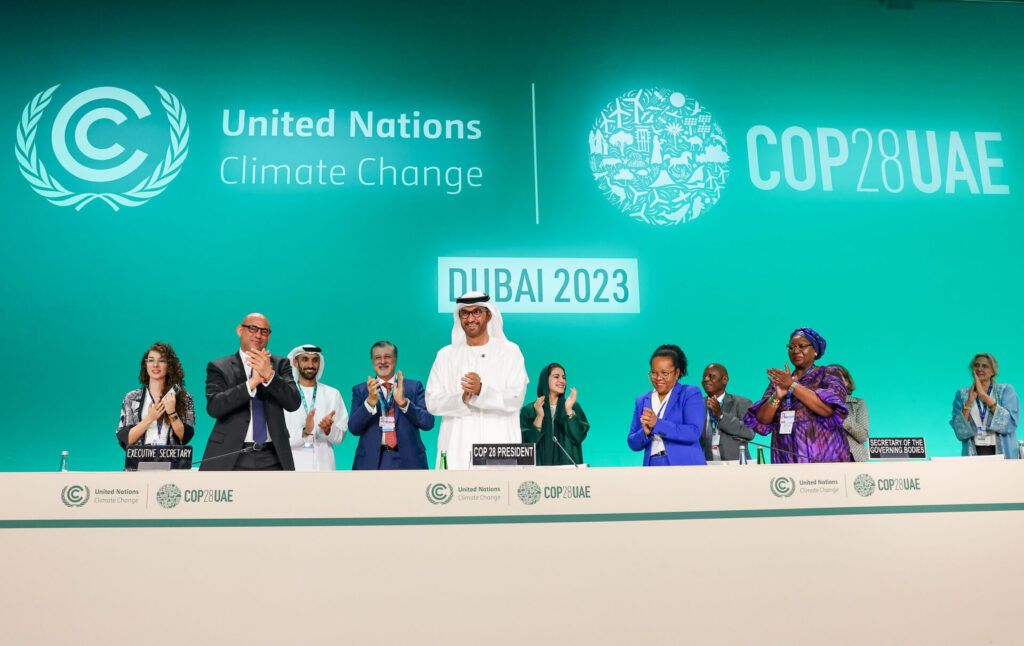At COP28, Vanuatu and Tuvalu lead the call for a Fossil Fuel Non-Proliferation Treaty to address climate crisis
By Alex Rafalowicz | December 8, 2023
 Sultan Al Jaber, COP28 President, and participants applaud at the UNFCCC Formal Opening of COP28 during the UN Climate Change Conference COP28 at Expo City Dubai on November 30, 2023, in Dubai, United Arab Emirates. (Photo by COP28 / Christopher Pike / Flickr CC BY-NC-SA 2.0 Deed)
Sultan Al Jaber, COP28 President, and participants applaud at the UNFCCC Formal Opening of COP28 during the UN Climate Change Conference COP28 at Expo City Dubai on November 30, 2023, in Dubai, United Arab Emirates. (Photo by COP28 / Christopher Pike / Flickr CC BY-NC-SA 2.0 Deed)
After decades of climate negotiations, fossil fuels have finally been dragged center stage at COP28, the climate conference taking place right now in the United Arab Emirates. This creates the ultimate test for whether or not the United Nations Framework Convention on Climate Change can address the primary cause of the climate crisis.
The signals so far have not been positive: A record number of fossil fuel lobbyists are in attendance—close to 2,500, in fact, compared to the 1,500 delegates representing the 10 most climate-vulnerable countries. And the COP28 President, Sultan Al Jaber, who is also the head of the UAE’s state-run oil company, claimed there was no science to support ending fossil fuels, a comment he had to walk back due to intense condemnation of the statement from scientists.
If global leaders can’t agree on a course of action to phase out fossil fuels, countries should do so independently by signing on to a Fossil Fuel Non-Proliferation Treaty, which I advocate for in my role as director of the Fossil Fuel Non-Proliferation Treaty initiative.
Oil, gas, and coal are responsible for 75 percent of greenhouse gas emissions and 90 percent of carbon dioxide emissions. According to the United Nations Environment Programme’s Production Gap Report, countries are on track to expand fossil fuel production to levels that would result in 110 percent more emissions than what is in keeping with limiting warming to 1.5 degrees Celsius above preindustrial levels, the goal set at the 2015 Paris climate conference.
Similarly, the recent Emission Gap report clearly shows that using all existing reserves would take the world well past that goal. The International Energy Agency’s Net Zero scenario hammers home the fact there can be no new fossil fuel projects if we’re to align our economies with science. There is no time to waste. It is critical that COP attendees take meaningful steps to phase out fossil fuels.
This would include: a recognition of the need to phase out all fossil fuels, not only coal, through the full life cycle of fossil fuels including production, transportation, and combustion. To send a clear signal to the market, the outcome should specify ending the expansion of new oil, gas, and coal production, including fossil fuel financing and subsidies.
The consideration of equity is also critical to these discussions. Wealthy countries—those most responsible for historic emissions and with economies least dependent on fossil fuel extraction income—must take the lead and support nations with greater fossil fuel dependence and less capacity to undertake the necessary economic and energy transition. A new report released at COP by over 200 civil society groups, including trade unions, outlines how phase-out dates could be differentiated between countries and the scale of resourcing that should be provided.
A key dividing line in the UN negotiations is likely to be over the inclusion of language such as “unabated emissions” and “inefficient subsidies.” These terms must be avoided as they create loopholes that stall action; there are no agreed definitions for either term, and both send a signal that some sort of industry and government support for fossil fuels should continue.
The negotiations should also work to develop a binding mechanism to realize such a phaseout and direct the finance required to accelerate the shift to clean energy and other low carbon solutions.
Fossil fuel exporting countries—including the United States, Canada, Saudi Arabia, among others—are likely to block or significantly weaken references to fossil fuels and commitments to take action. The consensus required in the UN climate change process has hindered action for decades, not to mention the presence and influence of the fossil fuel industry in negotiations.
Overcoming this impasse and releasing the chokehold the fossil fuel industry has on climate action requires innovation. That’s why a growing bloc of nations led by Vanuatu and Tuvalu are calling for an official mandate to negotiate a Fossil Fuel Non-Proliferation Treaty. Colombia, a significant coal and oil exporter, also recognized the need to end the era by calling for a Fossil Fuel Treaty during the first week of COP28. This treaty would end the expansion of oil, gas, and coal; wind down existing production to levels that would keep warming to 1.5 degrees Celsius above preindustrial levels, the target set in the Paris Agreement; and accelerate the transition to clean energy and other low carbon solutions with wealthy producer countries leading and providing resources and technical assistance to countries more dependent on fossil fuels and with less capacity to make the shift.
Given the limits of the UN consensus process, a bloc of nations—including Vanuatu, Tuvalu, Fiji, Solomon Islands, Tonga, Niue, Timor-Leste, Antigua and Barbuda, Palau, Colombia, and Samoa—has begun independent negotiations on a Fossil Fuel Non-Proliferation Treaty, including hosting high-level diplomatic dialogues with other nations not yet in the bloc at COP28.
Countries have come together to address historic threats like nuclear weapons, ozone depleting substances, landmines, and, most recently, plastics. Similarly, international cooperation is needed to ensure the phase out of fossil fuels. The creation and use of alternative forums have proven effective in many of these cases. Take, for example, the Land Mine Treaty. When it was clear the process within the UN was not advancing, Canada invited other nations to join them in Ottawa for talks outside of the existing forum until a new agreement was reached.
Our planet and future hangs in the balance. It’s time for governments to take action commensurate with the problem and stop throwing fuel on the fire. A key step would be joining the countries seeking a mandate to negotiate a Fossil Fuel Non-Proliferation Treaty.
Together, we make the world safer.
The Bulletin elevates expert voices above the noise. But as an independent nonprofit organization, our operations depend on the support of readers like you. Help us continue to deliver quality journalism that holds leaders accountable. Your support of our work at any level is important. In return, we promise our coverage will be understandable, influential, vigilant, solution-oriented, and fair-minded. Together we can make a difference.
Keywords: Fossil Fuel Non-Proliferation Treaty, climate action, climate conference, climate crisis, cop28, fossil fuels
Topics: Climate Change
















Thank you for your work on helping to phase out fossil fuels Climate, disease and war are constantly changing the course of human history. The control of these forces needs to be of the greatest priority requiring cooperation from all countries, peoples and societies. We could be running out of time.
A Fossil Fuel Treaty, yes! A Fossil Fuel Nonproliferation Treaty? I think not. You are illadvised to insert the word “nonproliferation” into your work; leave it out completely. Besides it just creates confusion about what should be done about the fossil fuel proliferation that has already occurred. Perhaps you are hoping to emulate the wide adherence to the Nuclear Non-Proliferation Treaty. But the NPT comes with a long history of noncompliance by the parties that proliferated in the 1945-1968 period and endless stall on reducing their arsenal of nuclear weapons; as well as the failure to rope in India, Pakistan,… Read more »